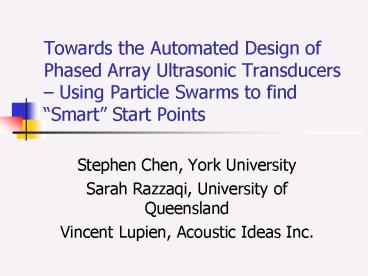Towards the Automated Design of Phased Array Ultrasonic Transducers - PowerPoint PPT Presentation
1 / 20
Title:
Towards the Automated Design of Phased Array Ultrasonic Transducers
Description:
Towards the Automated Design of Phased Array Ultrasonic Transducers Using ... Average value of each 'well' is directly related to the quality of the local optima ... – PowerPoint PPT presentation
Number of Views:328
Avg rating:3.0/5.0
Title: Towards the Automated Design of Phased Array Ultrasonic Transducers
1
Towards the Automated Design of Phased Array
Ultrasonic Transducers Using Particle Swarms to
find Smart Start Points
- Stephen Chen, York University
- Sarah Razzaqi, University of Queensland
- Vincent Lupien, Acoustic Ideas Inc.
2
Phased Array Ultrasonic Transducers
- A non-mechanical way to direct an energy beam
- Useful for Non-Destructive Evaluation
3
Continuum Probe Designer
- Product of Acoustic Ideas Inc.
- Automated design tool that creates an optimized
probe for a given inspection task - Removes art of design
4
Continuum Probe Designer Components
- Cost function generator uses exclusive
patent-pending technology to design an optimized
probe
5
Optimization Solver
- The optimized probe is developed for a given
probe geometry - Finding the best probe geometry is another
optimization task - In this paper, the probe designer is treated as a
cost function generator
6
Optimization Objective
- Probe costs are directly related to the number of
elements used in a design - Existing instrumentation can only control 32
independent channels at a time
7
An Evolution Strategy for the Optimization Solver
(CEC2006)
- Standard (1?)-ES with ? 3
- Performs significantly better than gradient
descent (i.e. fmincon) - Note fmincon takes about an hour and uses about
300 evaluations
8
Evolution Strategy vs. fmincon
- Tested on one expert selected and 29 random
start points - ES results are much better and more consistent
- ES results are still not good enough
fmincon (1?)-ES
76.2 32.5
70.8 3.9
5 18
9
Independent Parallel Runs
- High standard deviation suggests that using
multiple runs will lead to easy improvements - Results are better, but still not good enough
(1?)-ES Four parallel
32.5 31.3
3.9 2.9
18 22
10
Smart Start Points
- High correlation between ES solution and quality
of random start point - Use random search to find smart points
- Better results again
Four parallel Smart start pts
31.3 30.1
2.9 3.2
22 25
11
Analyzing Smart Start Points
- Is perceived correlation significant?
- From 120 random start points, apply the (1?)-ES
to the 30 worst and best
30 Worst 30 Best 30 Worst 30 Best
770.5 121.5 34.1 31.7
87.1 66.3 5.7 3.1
12
Smart Start Points on the TSP
- Is correlation an obvious/trivial observation?
- Correlation does not exist on TSP
30 Worst 30 Best 30 Worst 30 Best
1230 1128 11 11
18 16 1.3 2.4
13
Coarse Search does not Help on TSP
- Coarse search for better starting points does
not improve the performance of two-opt on the TSP
Four parallel Smart start pts
9.2 8.8
1.1 1.4
14
Improve Coarse Search
- Generate 50 random points
- Use best 4 to seed 4 PSOs
- Design PSOs to favour exploration over convergence
15
PSO vs. Random Searchto find Smart Start Points
- PSO finds even better start points
- Improved smart start points lead to an even
better performance
Random search PSO
30.1 29.2
3.2 1.9
25 27
16
Exploiting Global Convexity
- Search space is globally convex
- Seek centre of search space by coordinating
individual ESs with crossover
PSO With Crossover
29.2 28.5
1.9 1.3
27 30
17
Current Work
- Exploring Coarse Search Greedy Search
- Inspired by WoSP (CEC2005)
- Different from memetic algorithms (which apply
greedy search to every search point) - Useful for expensive evaluations
- Useful for non-globally convex search spaces
18
Rastrigin function
- Globally convex
- Average value of each well is directly related
to the quality of the local optima
19
Schwefel function
- NOT globally convex
- Average value of each well should still be
directly related to the quality of the local
optima
20
Summary
- Achieved important level of performance on
benchmark test suite for a difficult real-world
problem - Demonstrated potential of coarse search-greedy
search combinations































